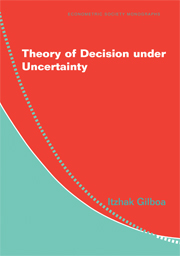16 - Prospect Theory
Published online by Cambridge University Press: 05 January 2013
Summary
BACKGROUND
When I was teaching this course 20 years ago and, in fact, even 10 years ago, I could find many students in class who had never heard of Kahneman and Tversky. I would then spend some time on their various findings and on prospect theory (PT). These dark ages are over. Today everyone knows about their project and about behavioral economics, and there is no need to argue with the extreme assumptions of rationality that were religiously held by economists throughout most of the 1970s and the 1980s. In fact, I sometimes marvel at how fast the pendulum swings. While behavioral economics often comes under attack, it is nowadays considered acceptable to introduce highly irrational modes of behavior into economic models. From assuming that economic agents are just as rational as the modeler, know all mathematical theorems, and know even unknowable things such as a prior probability over an overarching state space, the field suddenly started accepting agents who are systematically overoptimistic, ignore information at will, and violate dynamic consistency on a daily basis.
Behavioral economics is beyond the scope of this course, which focuses on the definition of probability from a rational point of view. Most of Kahneman and Tversky's contributions are too far in the realm of biases and mistakes as to be considered rational or normative.
- Type
- Chapter
- Information
- Theory of Decision under Uncertainty , pp. 154 - 159Publisher: Cambridge University PressPrint publication year: 2009



